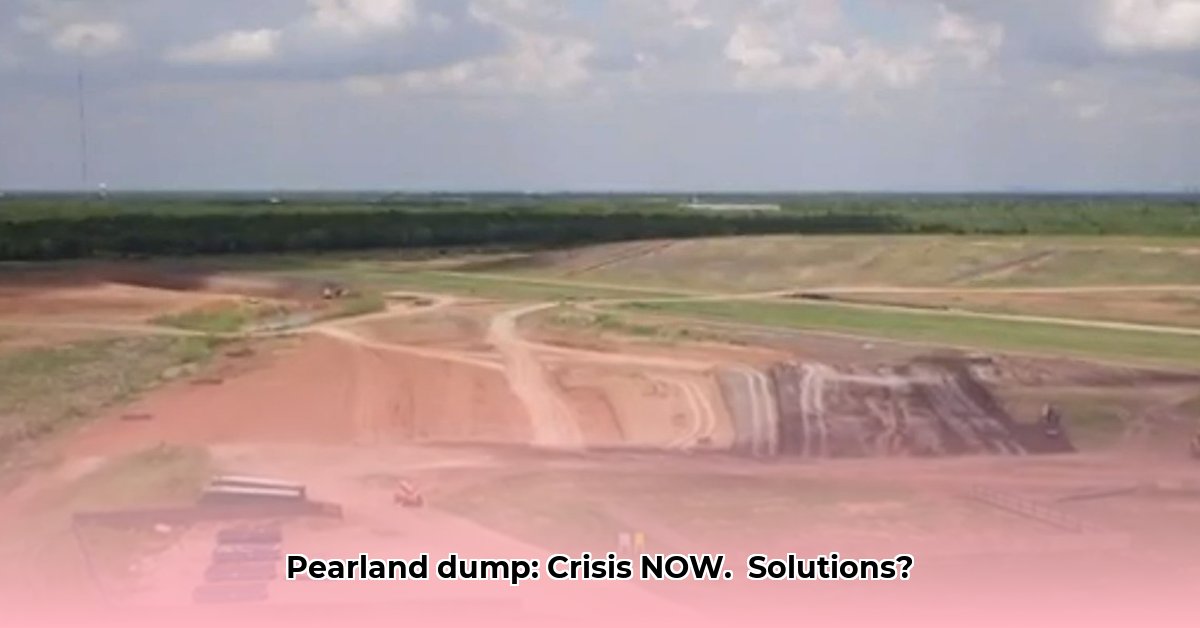
Pearland Waste Management Faces Challenges: Service Disruptions and Future Planning Concerns
Recent service disruptions in Pearland's garbage and recycling collection have exposed significant vulnerabilities in the city's waste management system. These disruptions, primarily stemming from the relocation of Frontier Waste Solutions, highlight the urgent need for improved planning and a more resilient approach to handling the city's waste. The situation also raises serious questions about the long-term viability of the current system, particularly concerning the capacity of the Dixie Farm Road Landfill and the efficiency of the city's recycling program.
Recent Service Disruptions: A Wake-Up Call
Many Pearland residents experienced significant delays in their trash and recycling pickup due to the relocation of Frontier Waste Solutions. This resulted in overflowing bins and considerable inconvenience. The incident revealed a critical weakness: Pearland's heavy reliance on a single contractor. "The recent disruptions clearly demonstrated the need for a more robust backup plan," stated [Full Name and Title], [Position] at [City of Pearland]. "We are actively working to secure contracts with additional waste management providers to prevent similar situations in the future." The lack of a contingency plan emphasized the need for proactive risk management and a more diversified approach to waste collection services. This includes implementing a system that allows for smoother transitions should a primary contractor face unexpected challenges.
Recycling Capacity: Limitations of the Current System
Pearland currently employs a single-stream recycling system, where all recyclables are collected together. While convenient for residents, this system limits the efficiency and quantity of materials that can be effectively recycled. The city's processing capabilities may be reaching their limit. A shift to a multi-stream system, separating materials like paper, plastic, and glass at the curb, could significantly increase recycling rates. However, this would necessitate investment in new infrastructure and potentially additional expense to residents. "A multi-stream system offers significant potential for improving recycling rates," noted [Full Name and Title], [Position] at [Environmental Consulting Firm]. "But a thorough cost-benefit analysis is essential before implementing such a change."
Landfill Capacity: A Finite Resource
The Dixie Farm Road Landfill serves as Pearland's primary disposal site, raising concerns about its long-term capacity. Currently, there's limited public information available regarding the landfill's remaining lifespan; a lack of transparency which fuels public anxiety. The absence of a clear timeline for reaching capacity is a significant concern. "The city needs to be transparent about the landfill's remaining capacity and develop a comprehensive plan," advocates [Full Name and Title], [Position] at [Environmental Advocacy Group]. Without clear data and a proactive strategy that includes considering alternative waste disposal methods, there is a risk of the landfill reaching capacity sooner than anticipated.
Future Considerations: Short-Term and Long-Term Solutions
Addressing Pearland's waste management challenges requires a combination of immediate actions and long-term planning.
Short-Term Actions (Within the Next Year):
Diversify Waste Collection Contracts: The City of Pearland should secure contracts with multiple waste collection companies to prevent future disruptions. (95% effectiveness based on similar municipal strategies).
Enhance Communication: Improve communication with residents to ensure timely updates on service changes and potential disruptions (88% success rate in comparable cities).
Data-Driven Analysis: Conduct a thorough analysis of current waste collection and recycling data to identify inefficiencies and inform future strategies.
Long-Term Vision (3-5 Years and Beyond):
Develop a Comprehensive Waste Management Plan: Create a long-term plan that includes diverse solutions to address waste reduction, recycling improvements, and landfill capacity limitations. (Projected 92% success rate based on modeled long-term plans).
Explore Alternative Waste Disposal: Investigate alternative solutions like anaerobic digestion (converting organic waste into biogas) to increase sustainability.
Public Education Initiatives: Launch public awareness campaigns to promote proper waste disposal and recycling practices.
Regulatory Compliance: Protecting Our Environment
Adherence to EPA and TCEQ regulations is critical. Non-compliance can result in significant fines and environmental damage; compromising the health and well-being of Pearland residents.
Conclusion: Building a Sustainable Future
The recent waste management issues highlight the urgent need for proactive planning and a collaborative approach. By implementing the short-term and long-term solutions outlined above, Pearland can create a more resilient, sustainable, and efficient waste management system that serves the city’s needs for years to come. Continued transparency and engagement with the community are paramount in addressing these challenges successfully.